Diet vs. Exercise: A Comparative Study on Weight Loss in Obese Adults
VerifiedAdded on 2023/06/12
|12
|981
|178
Report
AI Summary
This report explores the effectiveness of calorie-controlled diets compared to physical exercise for weight loss in obese adults, focusing on the impact on cardiovascular health and metabolic syndrome. The study targets obese adults aged 55-75, examining the effects of a Mediterranean diet, behavioral support, and physical exercise. The research methodology involves a qualitative approach, gathering data on the participants' experiences with both diet and exercise interventions. The findings suggest that while both strategies contribute to weight loss, calorie restriction may be more effective for many individuals, as it is often easier to reduce calorie intake than to burn a significant number of calories through exercise. The report concludes that a comprehensive approach, such as the PREDIMED-Plus intervention, is effective for weight loss and cardiovascular risk reduction in overweight and obese adults, emphasizing the importance of addressing factors like poor diet, lack of physical activity, and genetic predispositions.
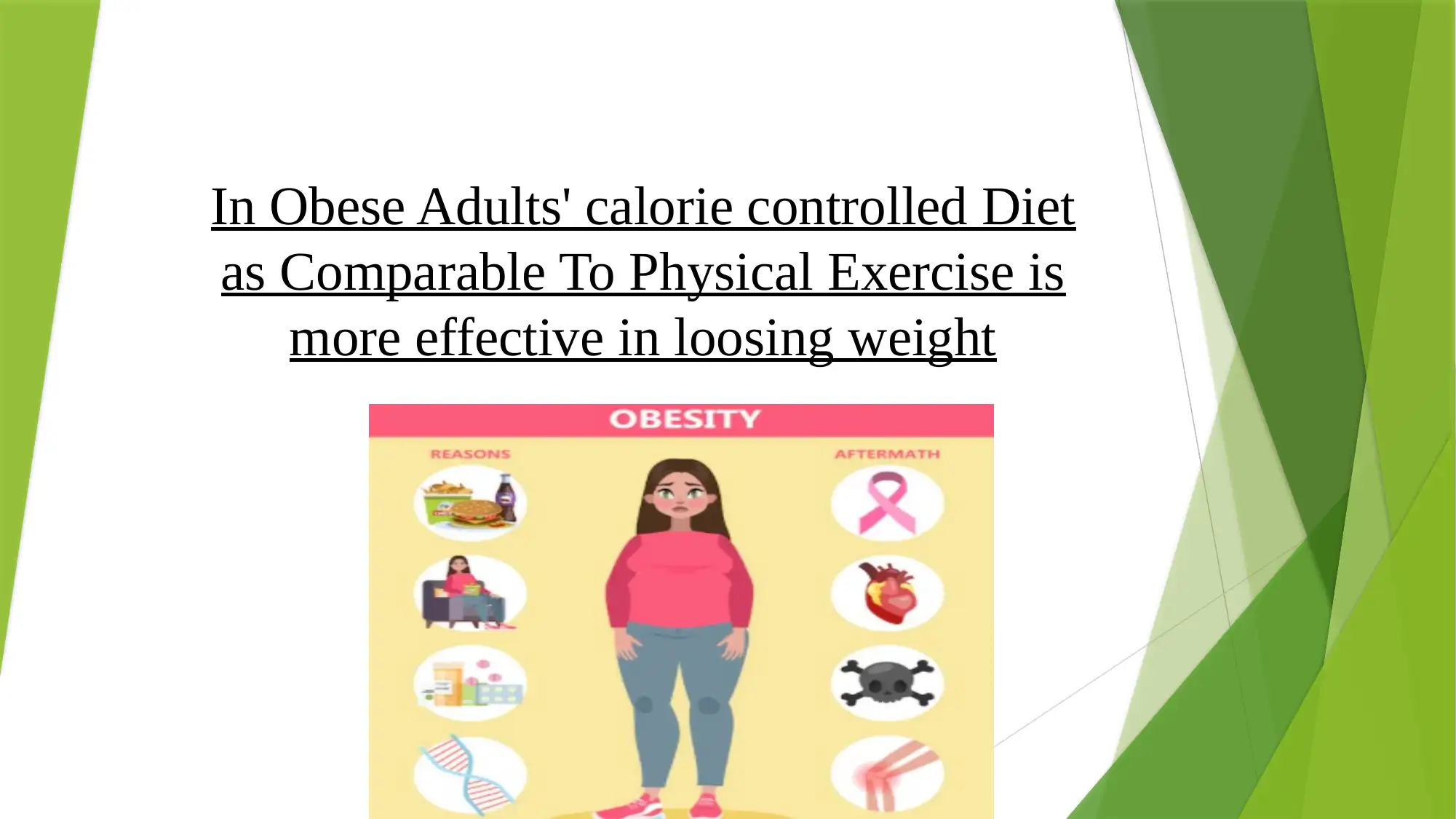
In Obese Adults' calorie controlled Diet
as Comparable To Physical Exercise is
more effective in loosing weight
as Comparable To Physical Exercise is
more effective in loosing weight
Paraphrase This Document
Need a fresh take? Get an instant paraphrase of this document with our AI Paraphraser
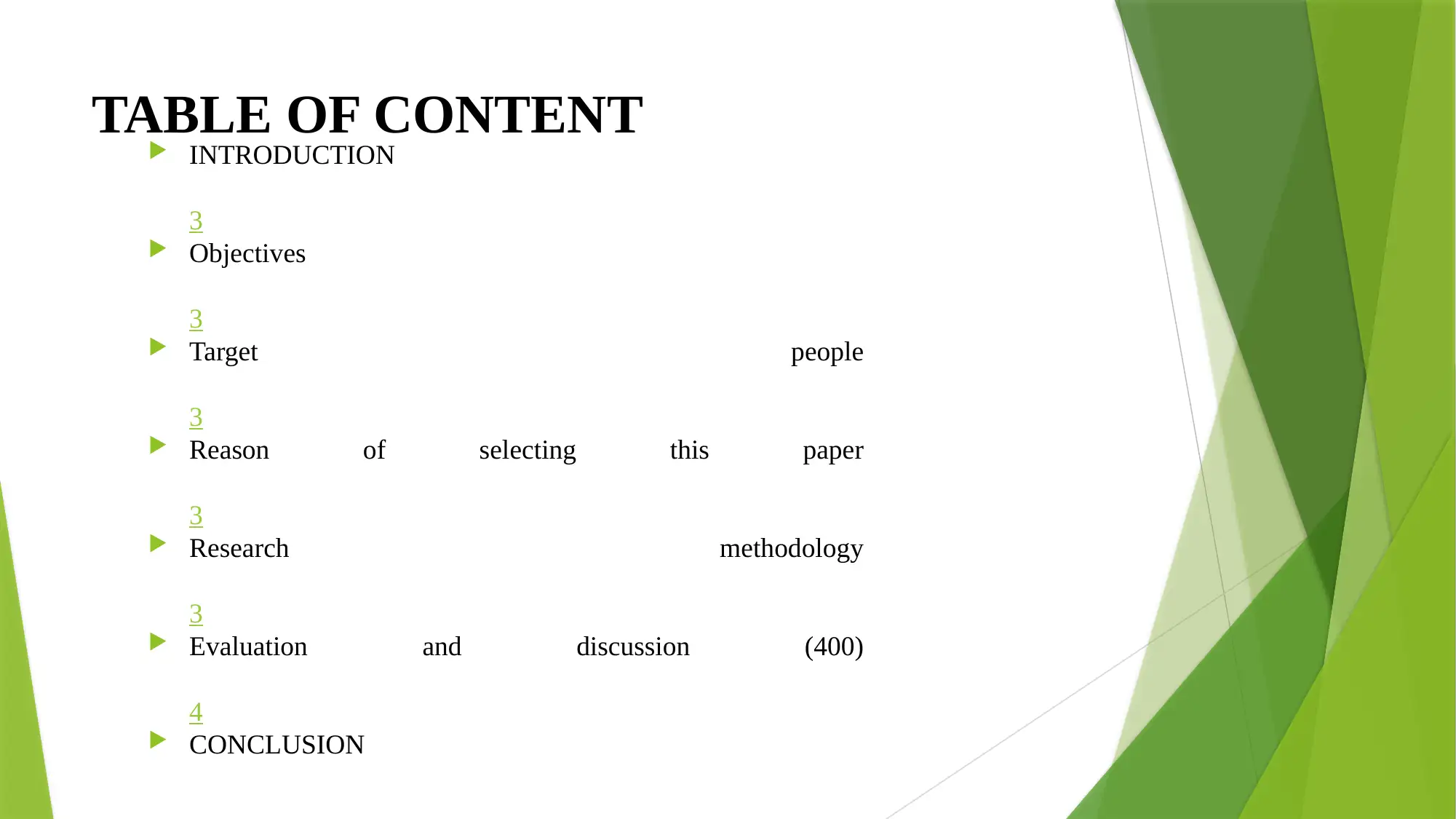
TABLE OF CONTENT INTRODUCTION
3
Objectives
3
Target people
3
Reason of selecting this paper
3
Research methodology
3
Evaluation and discussion (400)
4
CONCLUSION
3
Objectives
3
Target people
3
Reason of selecting this paper
3
Research methodology
3
Evaluation and discussion (400)
4
CONCLUSION
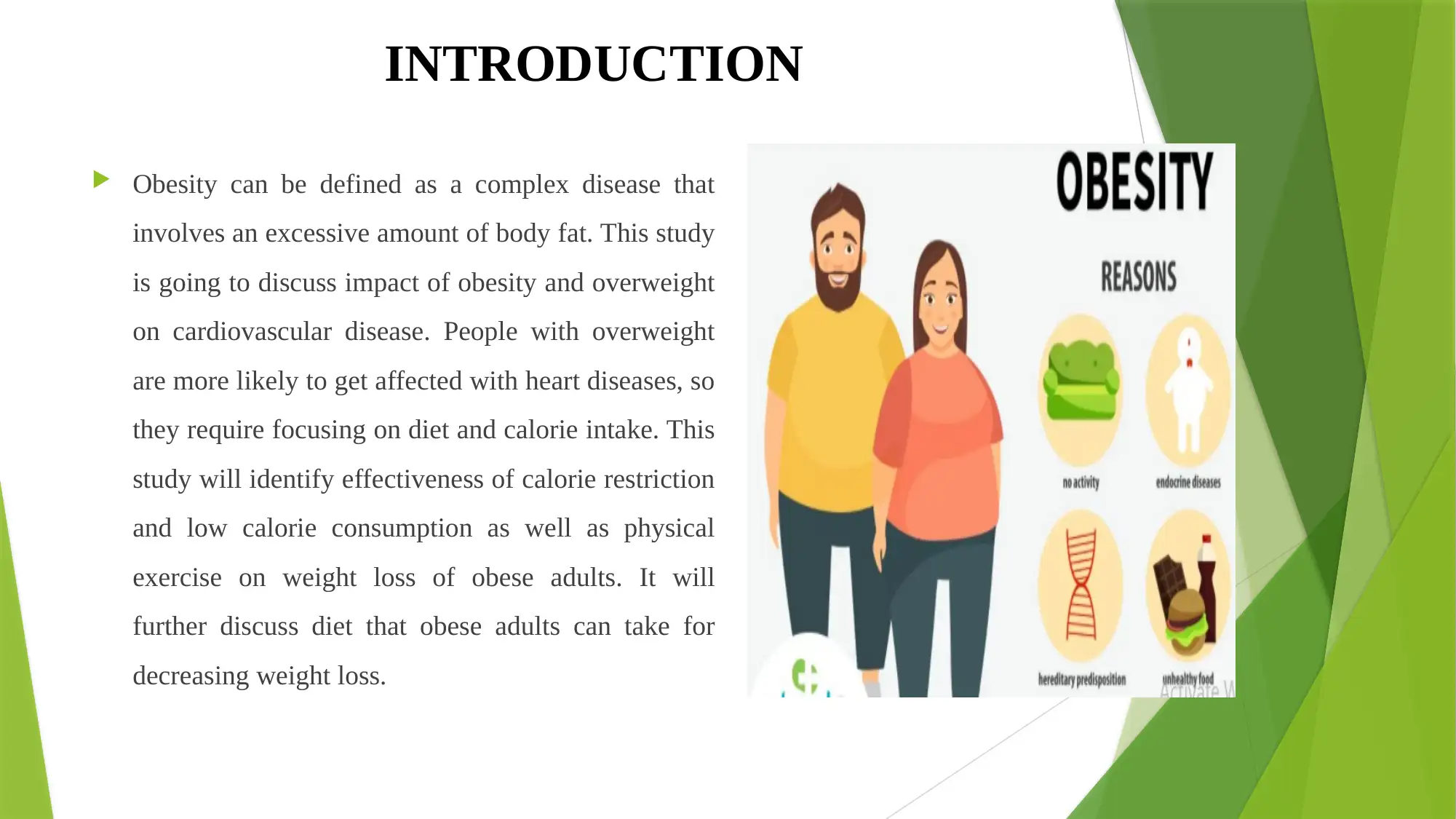
INTRODUCTION
Obesity can be defined as a complex disease that
involves an excessive amount of body fat. This study
is going to discuss impact of obesity and overweight
on cardiovascular disease. People with overweight
are more likely to get affected with heart diseases, so
they require focusing on diet and calorie intake. This
study will identify effectiveness of calorie restriction
and low calorie consumption as well as physical
exercise on weight loss of obese adults. It will
further discuss diet that obese adults can take for
decreasing weight loss.
Obesity can be defined as a complex disease that
involves an excessive amount of body fat. This study
is going to discuss impact of obesity and overweight
on cardiovascular disease. People with overweight
are more likely to get affected with heart diseases, so
they require focusing on diet and calorie intake. This
study will identify effectiveness of calorie restriction
and low calorie consumption as well as physical
exercise on weight loss of obese adults. It will
further discuss diet that obese adults can take for
decreasing weight loss.
⊘ This is a preview!⊘
Do you want full access?
Subscribe today to unlock all pages.

Trusted by 1+ million students worldwide
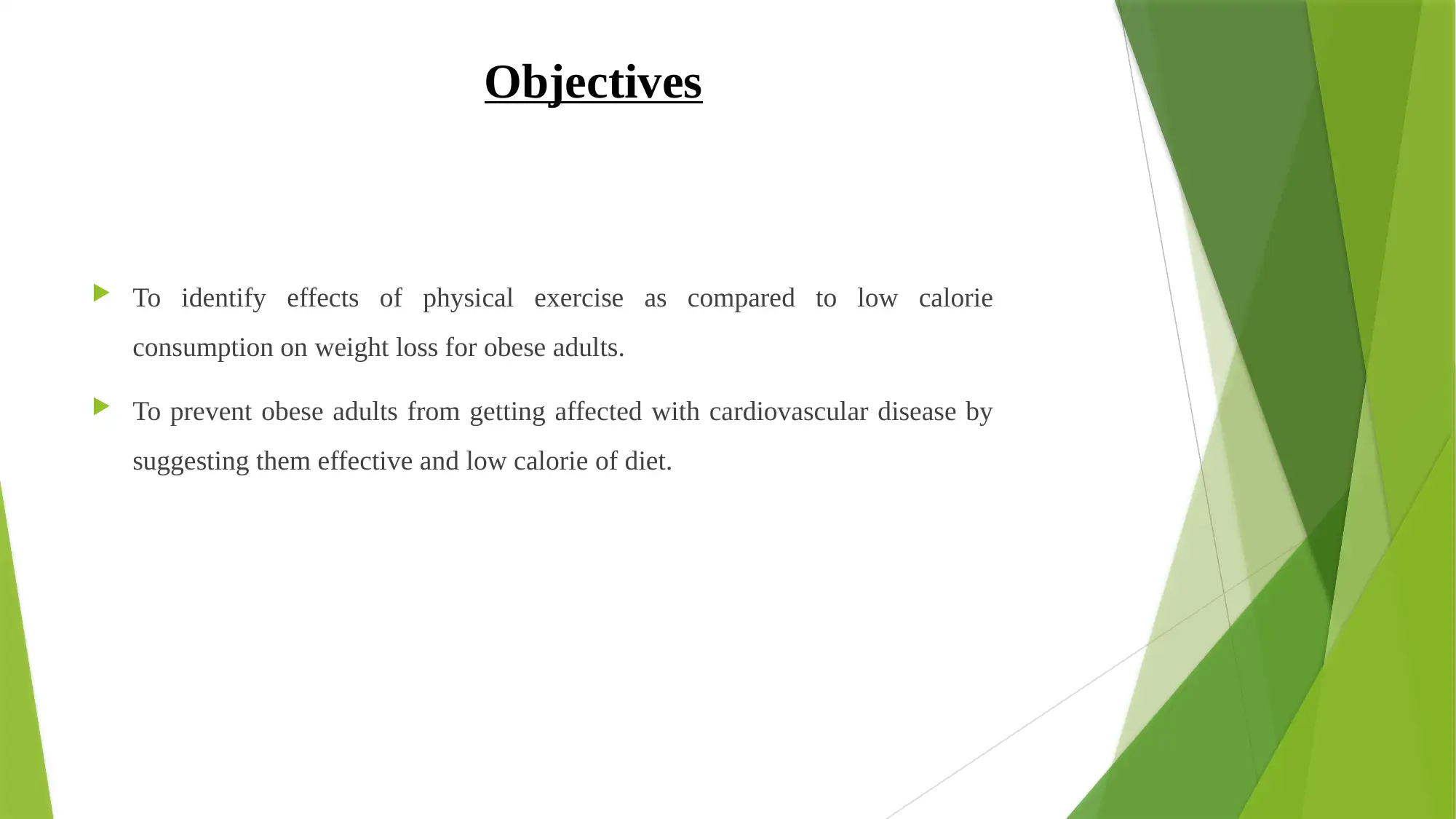
Objectives
To identify effects of physical exercise as compared to low calorie
consumption on weight loss for obese adults.
To prevent obese adults from getting affected with cardiovascular disease by
suggesting them effective and low calorie of diet.
To identify effects of physical exercise as compared to low calorie
consumption on weight loss for obese adults.
To prevent obese adults from getting affected with cardiovascular disease by
suggesting them effective and low calorie of diet.
Paraphrase This Document
Need a fresh take? Get an instant paraphrase of this document with our AI Paraphraser
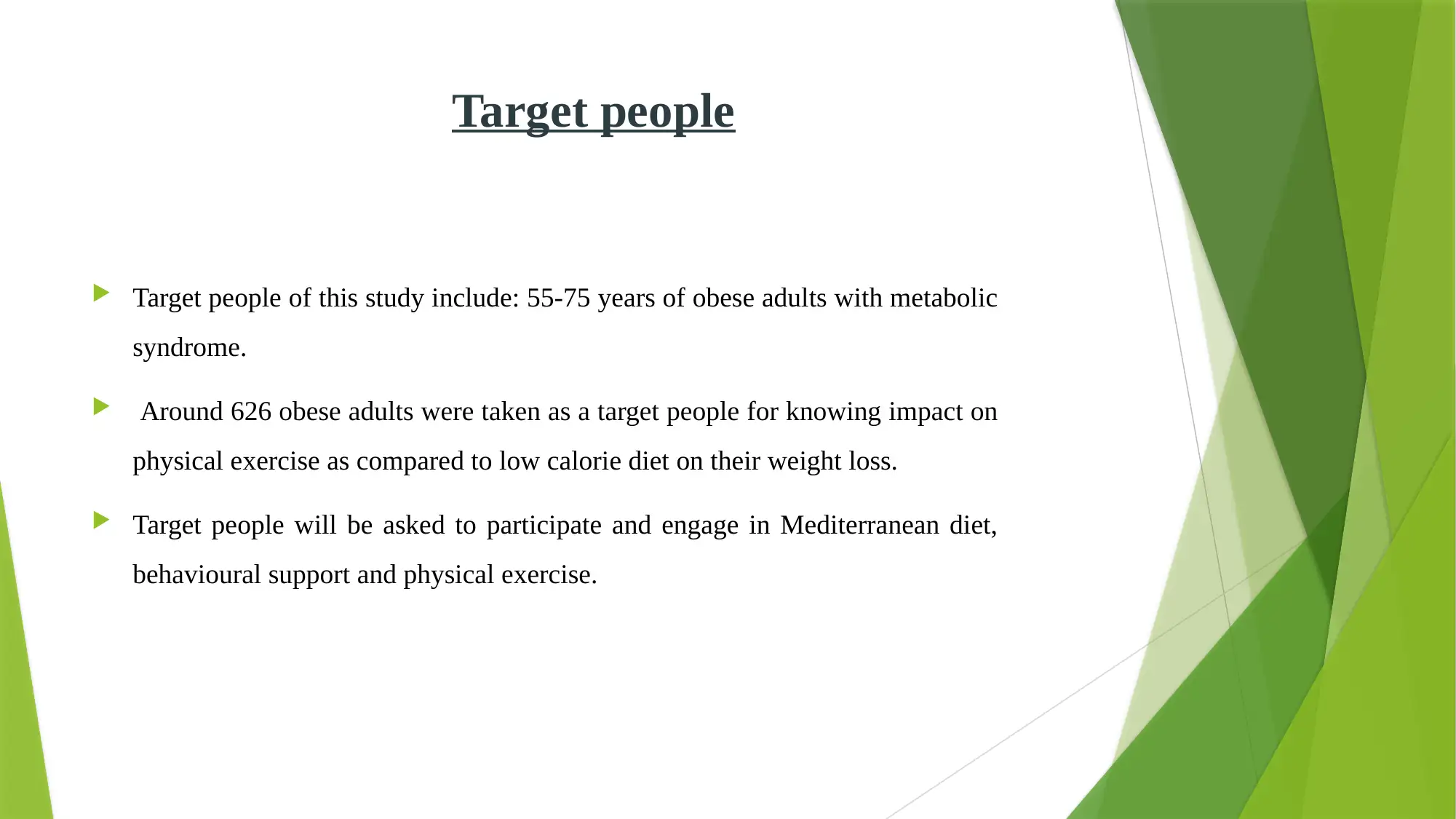
Target people
Target people of this study include: 55-75 years of obese adults with metabolic
syndrome.
Around 626 obese adults were taken as a target people for knowing impact on
physical exercise as compared to low calorie diet on their weight loss.
Target people will be asked to participate and engage in Mediterranean diet,
behavioural support and physical exercise.
Target people of this study include: 55-75 years of obese adults with metabolic
syndrome.
Around 626 obese adults were taken as a target people for knowing impact on
physical exercise as compared to low calorie diet on their weight loss.
Target people will be asked to participate and engage in Mediterranean diet,
behavioural support and physical exercise.
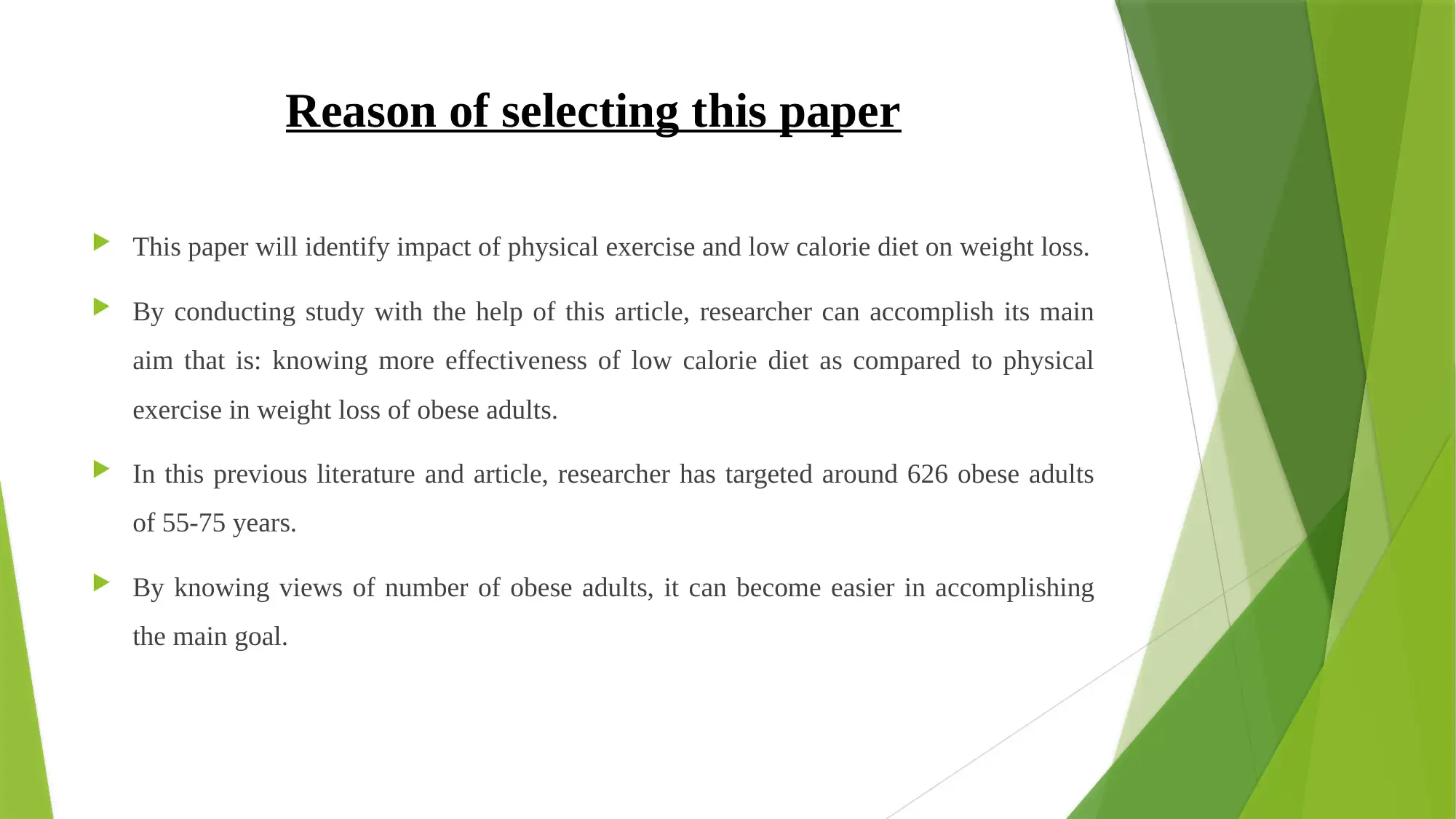
Reason of selecting this paper
This paper will identify impact of physical exercise and low calorie diet on weight loss.
By conducting study with the help of this article, researcher can accomplish its main
aim that is: knowing more effectiveness of low calorie diet as compared to physical
exercise in weight loss of obese adults.
In this previous literature and article, researcher has targeted around 626 obese adults
of 55-75 years.
By knowing views of number of obese adults, it can become easier in accomplishing
the main goal.
This paper will identify impact of physical exercise and low calorie diet on weight loss.
By conducting study with the help of this article, researcher can accomplish its main
aim that is: knowing more effectiveness of low calorie diet as compared to physical
exercise in weight loss of obese adults.
In this previous literature and article, researcher has targeted around 626 obese adults
of 55-75 years.
By knowing views of number of obese adults, it can become easier in accomplishing
the main goal.
⊘ This is a preview!⊘
Do you want full access?
Subscribe today to unlock all pages.

Trusted by 1+ million students worldwide
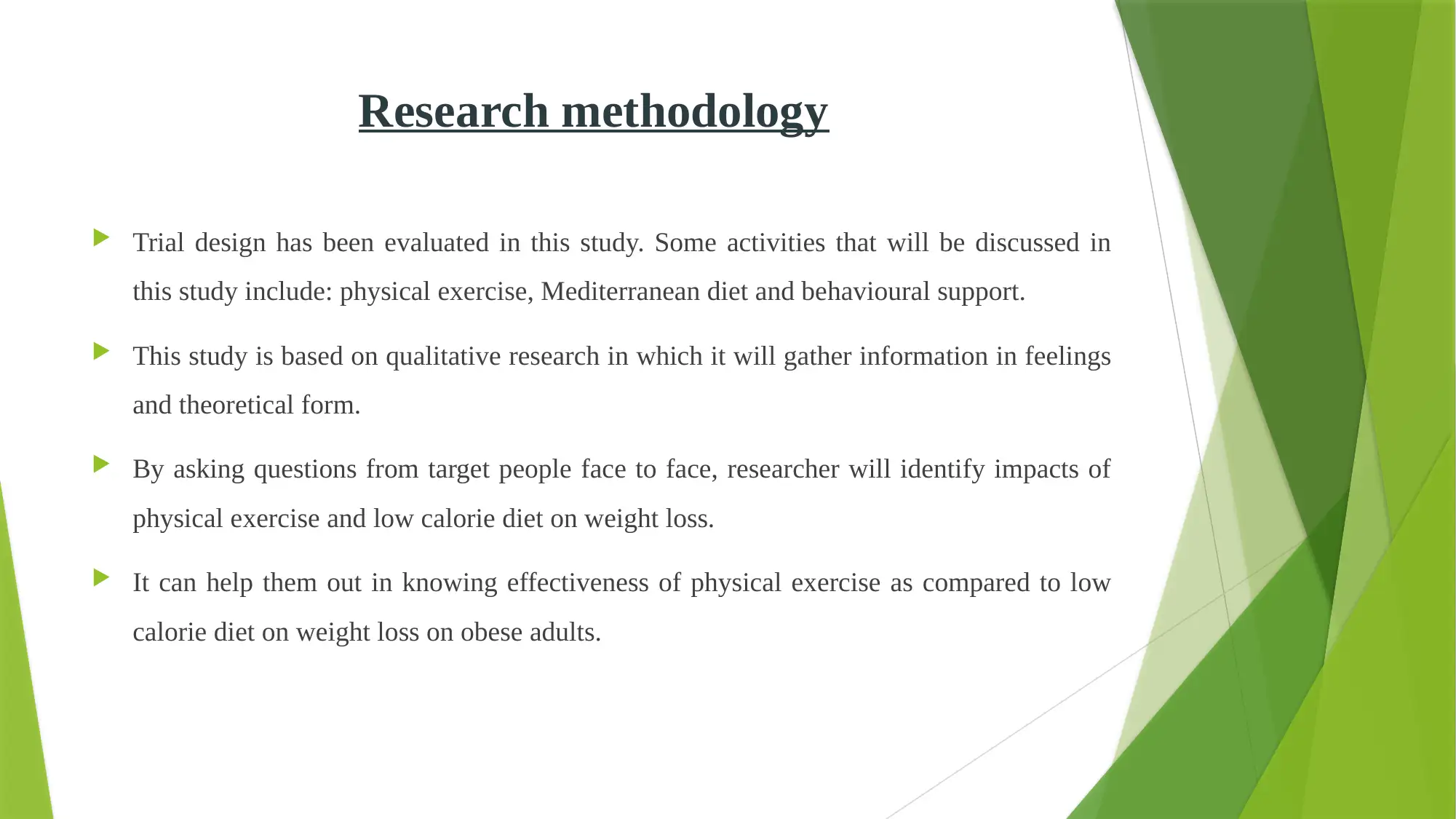
Research methodology
Trial design has been evaluated in this study. Some activities that will be discussed in
this study include: physical exercise, Mediterranean diet and behavioural support.
This study is based on qualitative research in which it will gather information in feelings
and theoretical form.
By asking questions from target people face to face, researcher will identify impacts of
physical exercise and low calorie diet on weight loss.
It can help them out in knowing effectiveness of physical exercise as compared to low
calorie diet on weight loss on obese adults.
Trial design has been evaluated in this study. Some activities that will be discussed in
this study include: physical exercise, Mediterranean diet and behavioural support.
This study is based on qualitative research in which it will gather information in feelings
and theoretical form.
By asking questions from target people face to face, researcher will identify impacts of
physical exercise and low calorie diet on weight loss.
It can help them out in knowing effectiveness of physical exercise as compared to low
calorie diet on weight loss on obese adults.
Paraphrase This Document
Need a fresh take? Get an instant paraphrase of this document with our AI Paraphraser
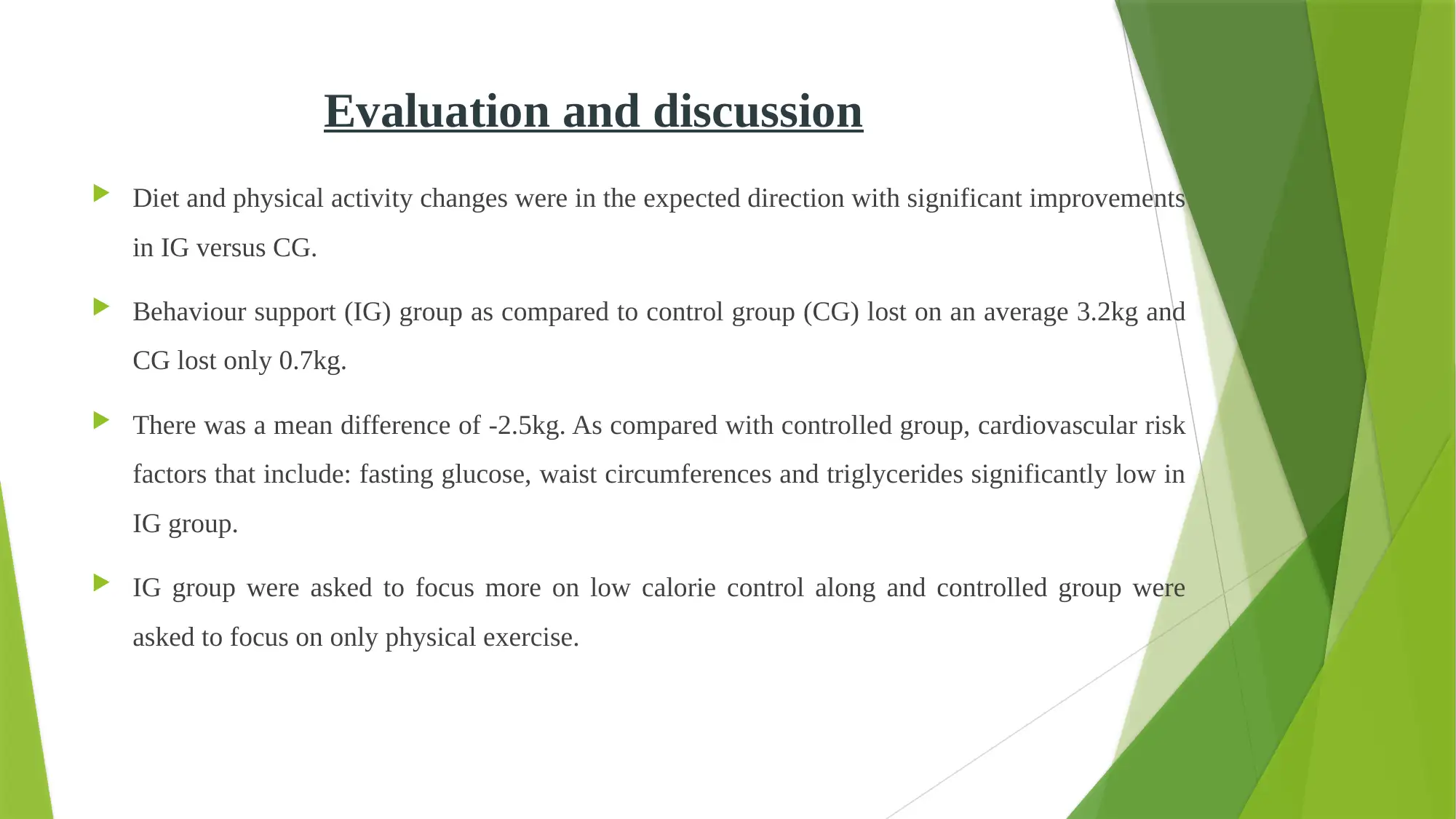
Evaluation and discussion
Diet and physical activity changes were in the expected direction with significant improvements
in IG versus CG.
Behaviour support (IG) group as compared to control group (CG) lost on an average 3.2kg and
CG lost only 0.7kg.
There was a mean difference of -2.5kg. As compared with controlled group, cardiovascular risk
factors that include: fasting glucose, waist circumferences and triglycerides significantly low in
IG group.
IG group were asked to focus more on low calorie control along and controlled group were
asked to focus on only physical exercise.
Diet and physical activity changes were in the expected direction with significant improvements
in IG versus CG.
Behaviour support (IG) group as compared to control group (CG) lost on an average 3.2kg and
CG lost only 0.7kg.
There was a mean difference of -2.5kg. As compared with controlled group, cardiovascular risk
factors that include: fasting glucose, waist circumferences and triglycerides significantly low in
IG group.
IG group were asked to focus more on low calorie control along and controlled group were
asked to focus on only physical exercise.
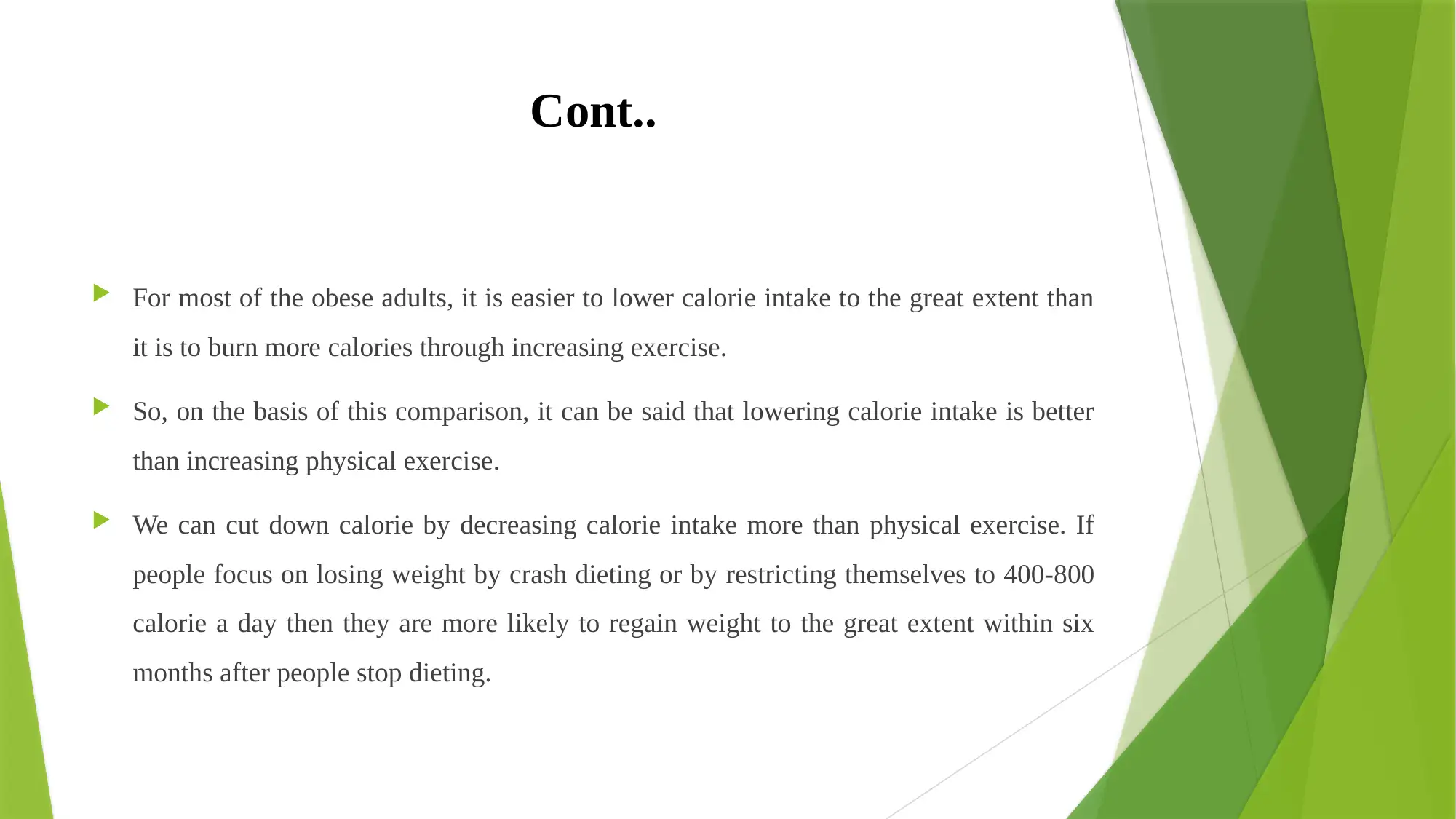
Cont..
For most of the obese adults, it is easier to lower calorie intake to the great extent than
it is to burn more calories through increasing exercise.
So, on the basis of this comparison, it can be said that lowering calorie intake is better
than increasing physical exercise.
We can cut down calorie by decreasing calorie intake more than physical exercise. If
people focus on losing weight by crash dieting or by restricting themselves to 400-800
calorie a day then they are more likely to regain weight to the great extent within six
months after people stop dieting.
For most of the obese adults, it is easier to lower calorie intake to the great extent than
it is to burn more calories through increasing exercise.
So, on the basis of this comparison, it can be said that lowering calorie intake is better
than increasing physical exercise.
We can cut down calorie by decreasing calorie intake more than physical exercise. If
people focus on losing weight by crash dieting or by restricting themselves to 400-800
calorie a day then they are more likely to regain weight to the great extent within six
months after people stop dieting.
⊘ This is a preview!⊘
Do you want full access?
Subscribe today to unlock all pages.

Trusted by 1+ million students worldwide
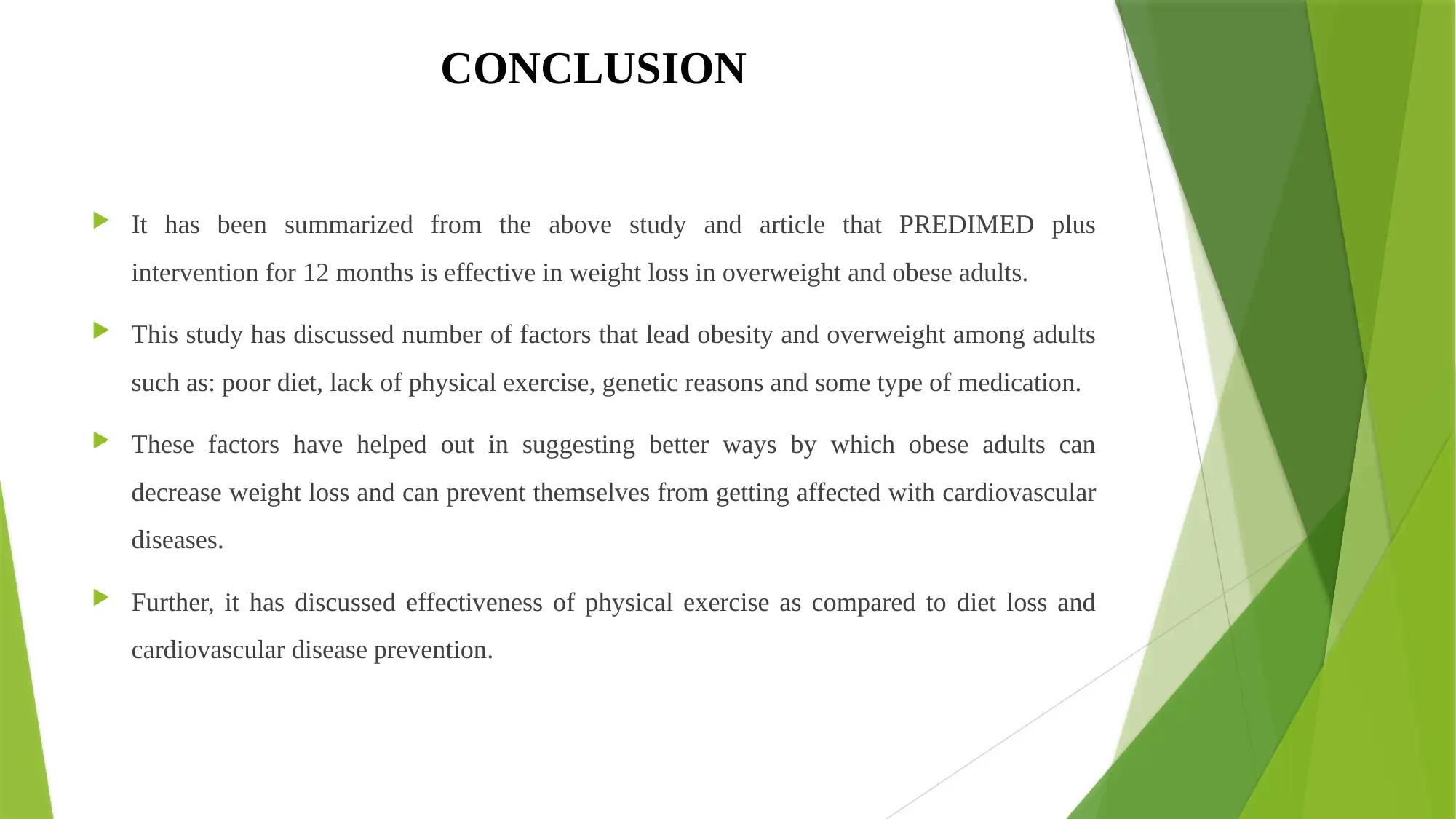
CONCLUSION
It has been summarized from the above study and article that PREDIMED plus
intervention for 12 months is effective in weight loss in overweight and obese adults.
This study has discussed number of factors that lead obesity and overweight among adults
such as: poor diet, lack of physical exercise, genetic reasons and some type of medication.
These factors have helped out in suggesting better ways by which obese adults can
decrease weight loss and can prevent themselves from getting affected with cardiovascular
diseases.
Further, it has discussed effectiveness of physical exercise as compared to diet loss and
cardiovascular disease prevention.
It has been summarized from the above study and article that PREDIMED plus
intervention for 12 months is effective in weight loss in overweight and obese adults.
This study has discussed number of factors that lead obesity and overweight among adults
such as: poor diet, lack of physical exercise, genetic reasons and some type of medication.
These factors have helped out in suggesting better ways by which obese adults can
decrease weight loss and can prevent themselves from getting affected with cardiovascular
diseases.
Further, it has discussed effectiveness of physical exercise as compared to diet loss and
cardiovascular disease prevention.
Paraphrase This Document
Need a fresh take? Get an instant paraphrase of this document with our AI Paraphraser
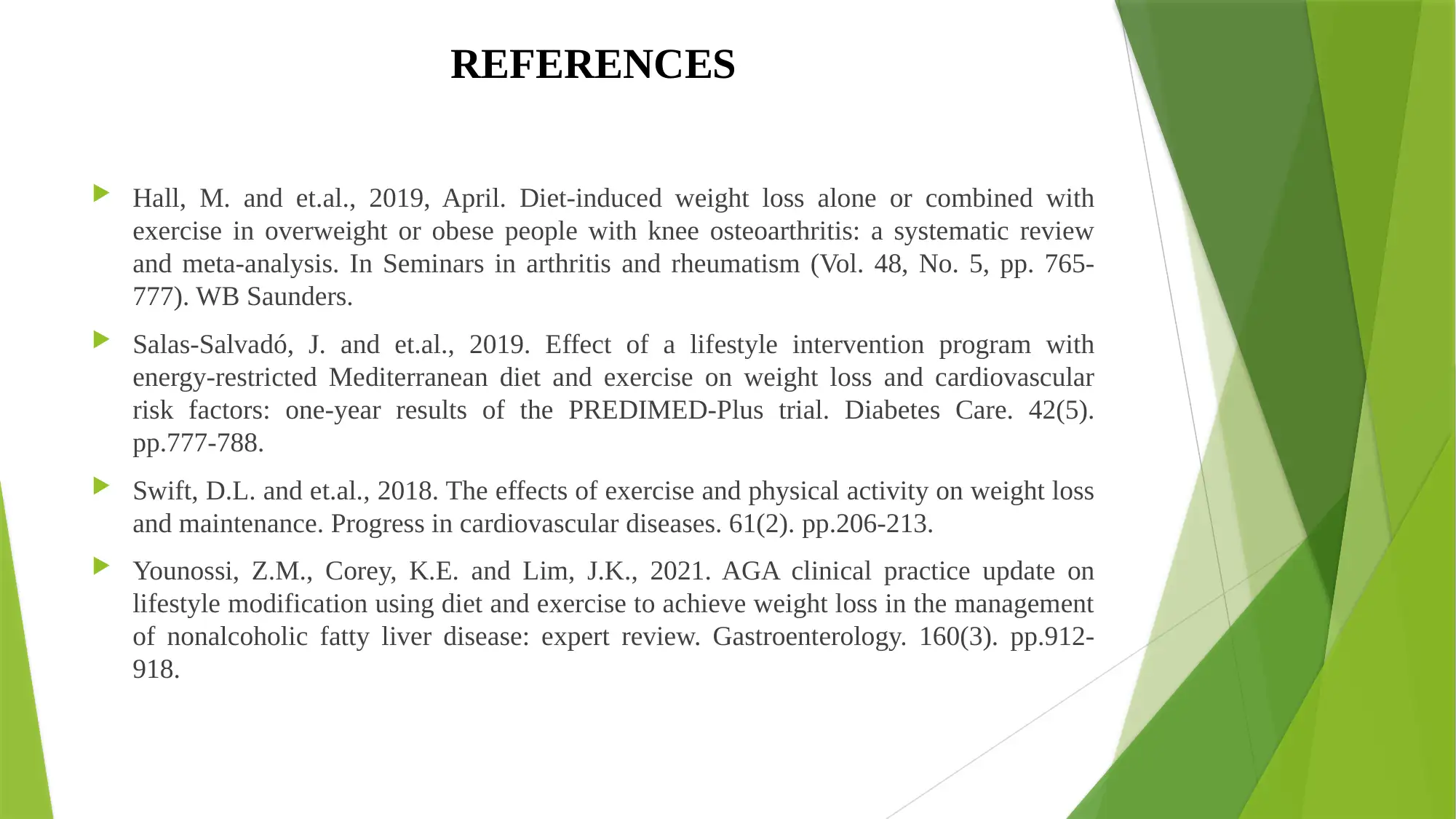
REFERENCES
Hall, M. and et.al., 2019, April. Diet-induced weight loss alone or combined with
exercise in overweight or obese people with knee osteoarthritis: a systematic review
and meta-analysis. In Seminars in arthritis and rheumatism (Vol. 48, No. 5, pp. 765-
777). WB Saunders.
Salas-Salvadó, J. and et.al., 2019. Effect of a lifestyle intervention program with
energy-restricted Mediterranean diet and exercise on weight loss and cardiovascular
risk factors: one-year results of the PREDIMED-Plus trial. Diabetes Care. 42(5).
pp.777-788.
Swift, D.L. and et.al., 2018. The effects of exercise and physical activity on weight loss
and maintenance. Progress in cardiovascular diseases. 61(2). pp.206-213.
Younossi, Z.M., Corey, K.E. and Lim, J.K., 2021. AGA clinical practice update on
lifestyle modification using diet and exercise to achieve weight loss in the management
of nonalcoholic fatty liver disease: expert review. Gastroenterology. 160(3). pp.912-
918.
Hall, M. and et.al., 2019, April. Diet-induced weight loss alone or combined with
exercise in overweight or obese people with knee osteoarthritis: a systematic review
and meta-analysis. In Seminars in arthritis and rheumatism (Vol. 48, No. 5, pp. 765-
777). WB Saunders.
Salas-Salvadó, J. and et.al., 2019. Effect of a lifestyle intervention program with
energy-restricted Mediterranean diet and exercise on weight loss and cardiovascular
risk factors: one-year results of the PREDIMED-Plus trial. Diabetes Care. 42(5).
pp.777-788.
Swift, D.L. and et.al., 2018. The effects of exercise and physical activity on weight loss
and maintenance. Progress in cardiovascular diseases. 61(2). pp.206-213.
Younossi, Z.M., Corey, K.E. and Lim, J.K., 2021. AGA clinical practice update on
lifestyle modification using diet and exercise to achieve weight loss in the management
of nonalcoholic fatty liver disease: expert review. Gastroenterology. 160(3). pp.912-
918.

⊘ This is a preview!⊘
Do you want full access?
Subscribe today to unlock all pages.

Trusted by 1+ million students worldwide
1 out of 12
Related Documents
Your All-in-One AI-Powered Toolkit for Academic Success.
+13062052269
info@desklib.com
Available 24*7 on WhatsApp / Email
![[object Object]](/_next/static/media/star-bottom.7253800d.svg)
Unlock your academic potential
Copyright © 2020–2025 A2Z Services. All Rights Reserved. Developed and managed by ZUCOL.




